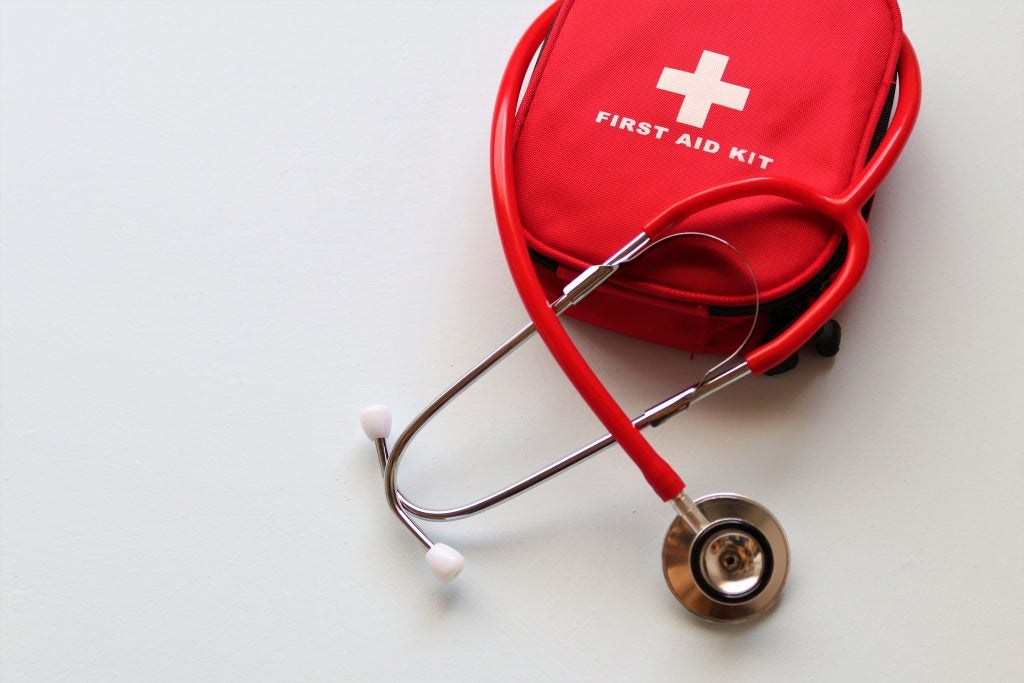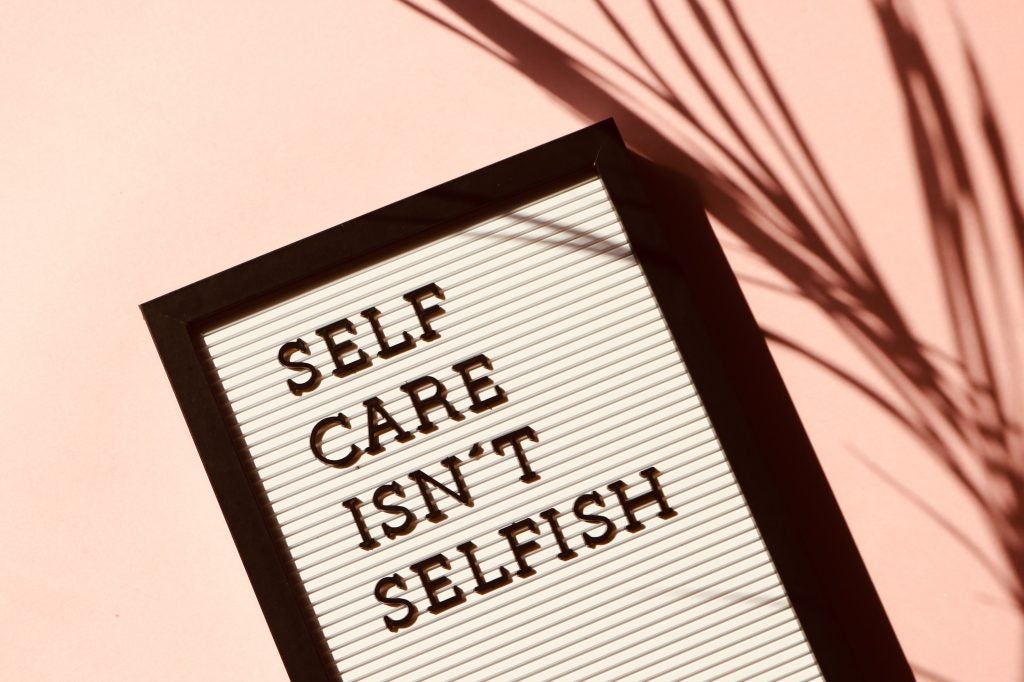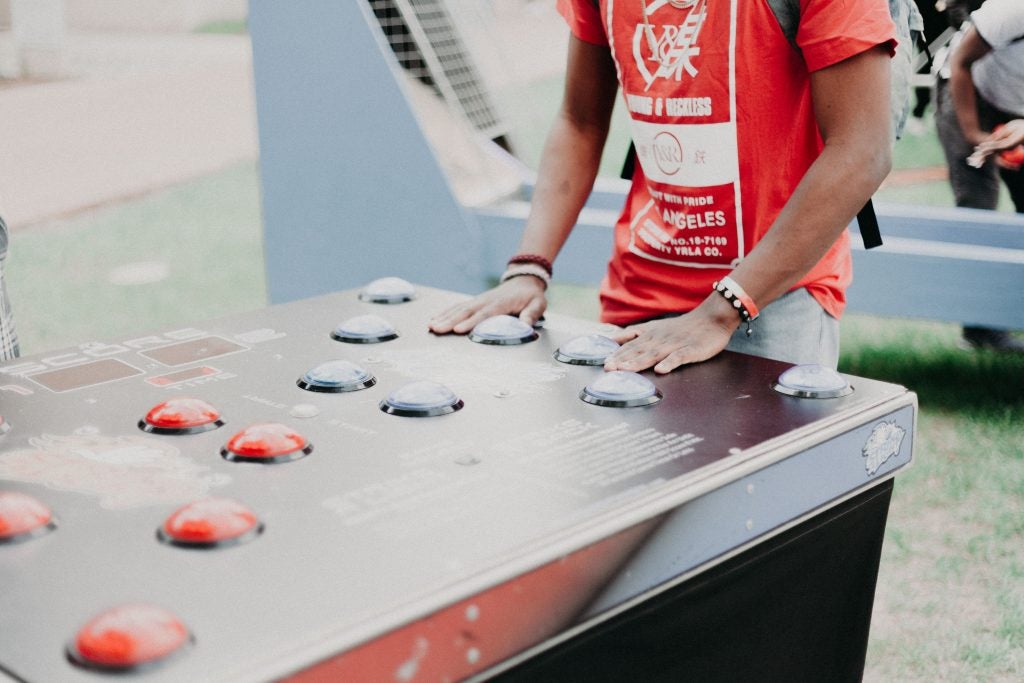Module 5: Developing and Maintaining Healthy Routines (Part 1)
Personal Wellness
Introduction
Objective: The student will develop at least 3 personal wellness goals with specific strategies for implementation for the first year on campus.
This lesson is designed to motivate you to start thinking about personal wellness and how wellness can help with academic success.
Estimated time 30—45 minutes
Materials included:
Materials needed:
- Internet access
Curriculum Link:
This section corresponds with Module 5 Lesson 1 in the College Bound Transition curriculum resources.
Learn About It
What is wellness?
An introduction to the eight dimensions of wellness.
According to the Medical Dictionary for Health Professions and Nursing (2012), “wellness” can be defined as:
- Good physical, mental, and emotional health
- Lifestyle that promotes balance through healthful practices and attitudes
- Philosophy of health as realization of full potential instead of just avoidance of illness
- Achieved through positive attitudes, fitness training, a diet low in fat and high in fiber, and the avoidance of unhealthful practices (smoking, drug and alcohol abuse, overeating).
Source: Medical Dictionary for the Health Professions and Nursing© Farlex 2012, retrieved from http://medical‐dictionary.thefreedictionary.com/wellness)
Why is Wellness an Important Issue for Students?
- Academic success is one of a college student’s primary responsibilities. That’s not an easy responsibility to fulfill! One of the most important things you can do to ensure your academic success is to take good care of your body and mind.
- Take a moment to think about all that goes into keeping you physically and mentally healthy.
- There are many components of health and wellness. College students are often just beginning to take responsibility for many aspects of their own wellness.
Components of Wellness
- Nutrition
- Exercise routines
- Sleep hygiene
- Prevention & care of illness/injury
- Medication routines
- Stress management
- Psychological/mental health
- Healthful living space
- Social relationships
- Recreational activities
- Safety precautions
- Personal health choices
- Spirituality
These topics will be discussed in detail in the rest of this module.
Parents Chime In
- Personal wellness is often overlooked in the rush and excitement of getting ready to go to college. Taking time to review the components of personal wellness with your student will go a long way toward helping with his or her academic success. On their own for the first time, many students neglect their personal wellness.
- Review the components of personal wellness with your student. Talk about your student’s existing personal wellness routines. Look at the components presented above and list those that your student may need to learn more about.
- Talk with your student about your own personal wellness routines and how they are beneficial to you.
- Have your student read through the following information on each of the personal wellness components.
Nutrition
Fitness & Nutrition Tips for College Students
As a high school student, it’s likely that your parents look out for many of your nutritional needs simply by handling the grocery shopping, meal planning, and meal preparation. Once you arrive on campus, though, you will bear the responsibility for being able to identify what food is healthful, deciding whether to follow those recommended guidelines, and then finding, preparing, and eating those foods.
If you have a meal plan on campus, this will remove at least some of the responsibility for food preparation. Although dining halls have healthful options available, it’s entirely possible to select foods that don’t promote wellness instead. Given the freedom to choose what to eat and when to eat it, many students struggle to establish positive habits in this area. You can lean on many resources for helping you with this, including those at your school (e.g., nutritionist, health education programs), guidance from your parents, and resources available online (e.g., food tracking apps, nutritional information).
Try to choose foods from these healthy groups:
- Whole grains: give your brain and muscles energy; a good source of B vitamins and iron. Include rice, potatoes, pasta, and whole-grain bread. Try to eat one portion at every meal.
- Lean proteins: build muscles, fight infection, and heal wounds. Try having beans, peanut butter, fish, tofu, or eggs at 2 meals per day.
- Fruits and vegetables: benefit eyes and hair and boost your immune system; a good source of vitamins A and C, minerals, and fiber. Try to include apples, broccoli, pears, carrots, squash, and salad 5‐7 servings per day (2 1/2 cups of veggies and 2 cups of fruit).
- Milk or other dairy products: help maintain strong bones and teeth; a good source of calcium and protein. Include a serving of low-fat dairy foods like milk, cheese, yogurt, cottage cheese, pudding, or frozen yogurt 3 times per day.
- Fats and Oils: keep hair and skin soft and give a feeling of fullness; a good source of dietary fat. Try to include a little fat like salad dressing, olive oil, guacamole, nuts, or seeds at each meal.
Exercise Routines
Plan, implement, and stick to a regular exercise routine. This might include:
- Incorporating both strength-building and endurance-building activities
- Finding time to exercise: building in 30 minutes of exercise into your daily routine is ideal.
- Staying motivated: explore exercise options such as walking, running, cycling, playing a sport, swimming, spinning, various exercise classes (e.g., Zumba, Pilates, etc.), or other options at your student recreation center.
- Working out with a friend or personal trainer also helps you stay motivated.
- Avoiding injuries by varying the type of activity.
Sleep Hygiene

Sleep hygiene refers to getting the right amount of sleep for your body. Think about how you can maintain a functional sleep schedule. This can be challenging; college students’ daily routines alter drastically compared with their high school schedules.
Consider these strategies:
- Set up and stick to a bedtime—be consistent.
- Get up around the same time every day—be consistent.
- Manage your time well to avoid all-nighters. Stay on top of tests and projects by preparing in advance; all-nighters often have worse effects than not studying at all.
- Prioritize sleep. Know when to say no to social engagements and catch up on your sleep.
Learn to deal with sleep disruptions effectively. It’s all too easy for college students to become nocturnal, sleeping during the day between classes and staying up all night. If this happens, take a weekend to reset your sleep schedule. It may be a miserable weekend, but getting back on a functional sleep schedule will be worth it in the end.
Living in the dorm, you’ll likely encounter sleep disruptions on a regular basis: people in the hallway making noise, your roommate coming home and turning on the overhead light at 3 am, and fire alarms are all common experiences in college. Although there’s nothing you can do about some of these disruptions (like the fire alarm), you can be prepared for others by sleeping with earplugs or a sleep mask, running a fan or air conditioner, or choosing the bottom bunk and hanging up blankets to create a dark environment.
Most adults need about 8 hours of sleep each night. Sleep allows our bodies to restore and repair themselves. Sleep is particularly important for college students; lack of sleep diminishes memory and weakens our ability to learn. It can also lead to a lowered immune system, as a sleep deprived body doesn’t have enough restorative time/resources to fight off germs.
Prevention & Care of Illness/Injury

Suggested basic routines:
- Avoid injuries and illnesses: make smart health decisions (e.g., wash your hands, brush your teeth, don’t eat raw meat, don’t jump off the roof).
- Properly treat minor illnesses and injuries before they become serious.
- Recognize when medical attention is needed and know which resources to access.
- Use the student healthcare center. College students are often fortunate to have medical care and facilities available right on campus at low cost. Many campus health centers offer both routine and acute care in addition to pharmacy services.
- Don’t rely on the Internet or the advice of non-medical-professionals to self-diagnose.
- Create and maintain a first-aid kit. Bring a first‐aid kit to campus and keep it stocked with things like bandages, antibiotic ointment, and over‐the‐counter pain medications.
Parents Chime In
If your child does not already take responsibility for medication routines, help him or her to start doing so before leaving for college. It can be scary for parents to let go of good routines, but if your student has time to practice before leaving home, he or she will be more likely to maintain his or her own good routines in college.
Medication Routines
The importance of taking medication as prescribed.
Students, it’s time to start taking the lead on this!
If you take daily medications, be consistent:
- Take medications at the same time every day.
- Set an alarm or write a reminder.
- Create a routine (e.g., place the pill bottle on top of your keys every night so you can’t leave your room without seeing the bottle).
Refill medications before running out. You may want to enter the date when a refill will be needed (e.g., 30 days in the future) on your planner or calendar as soon as you pick up the current prescription. Back up a few days and add a prompt to have them refilled.Prepare to cope with side effects. Know what to expect, when to be concerned, whom to contact if side effects become problematic, and how to ameliorate the side effects. Some medications should be taken at specific times or with/without specific foods. If your parents know this information but you don’t, ask them before you leave for college. Go with your parents to pick up your next medication refill. Ask the pharmacist to talk with you about each medication.
Consult with medical professionals as needed.
Begin practicing your medication routines before you leave for college. Ask your parents to help you do so.
Psychological/Mental Health

It is just as important as physical health!
- Recognize when stress or other psychological concerns (e.g., depression, anxiety, substance abuse, bipolar, or adjustment problems) have surpassed the level at which you can deal with them independently.
- In college, you will have less direct interaction with the people who know you best and know the “warning signs” that you’ve exhausted your personal coping resources. As a result, you’ll need to be able to figure these things out on your on and seek resources when you need them.
- Maintain psychological well-being through counseling, therapy, and/or medication as needed. Most college campuses are well equipped to deal with the psychological and mental health issues that most commonly affect college students and may offer options for counseling, therapy, medication, support groups, education, skills training, and more.
- Keep in mind also that college counseling centers are not meant only for those with the most severe issues. They routinely serve students facing minor challenges who just need some support to get through the situation. Some students also assume that there must be a stigma associated with using mental health resources—for example, that they’re for “crazy people.” Again, this could not be further from the truth. Don’t hesitate to take advantage of these resources for fear that others will think differently of you. You may be surprised to find out that many of those whose opinions you’re questioning have used similar services themselves.
Healthy Living Space
Maintaining a living space that’s conducive to good physical and mental health will go a long way once you’re in college. With all the other things on your mind, it’s easy for cleaning to become an afterthought. Suddenly one stack of papers becomes five, one cereal bowl becomes ten, and the room is a disaster. It is much easier to pick up after yourself for a few minutes each day than to let things build up so that you have to spend an hour or more cleaning.
Tasks that can be quickly accomplished through daily or weekly attention include:
- Declutter: putting away clothing, putting books and notebooks on a shelf or in your bookbag, stowing items in the storage bin, closet, dresser, or desk where they belong
- Doing your laundry: keeping dirty laundry in a hamper or laundry bag, washing clothes regularly, putting clean laundry away
- Washing dishes immediately after using them and putting them away
- Keeping surfaces (floor, furniture, etc.) clear of dirt, dust, and debris by occasionally sweeping, vacuuming, dusting, or just picking up spills.
- A dorm room doesn’t necessarily need to be spotless enough to be featured in a college brochure, at a certain point you can start to feel the negative effects of clutter or uncleanliness.
- If your room is actually dirty (e.g., used dishes, spoiled food, spills, lots of dust), it can eventually become a physical health hazard.
- A room that’s just cluttered or messy (e.g., piles of papers, books, clothes, other items laying around) is more likely to affect your mental or psychological state. It can add to your stress level by feeling overwhelming to clean everything, and it can make it harder to locate items you need. Although it sounds clichéd, for many people, having an organized living space makes it easier to maintain a state of mental organization as well.
Living space issues can also be tied into roommate issues. The state of your room may correspond with the state of your roommate relationship, and you may need to work on communicating and compromising with your roommate if you have different ideas about the ideal level of cleanliness or clutter. In addition, sharing a small space with another person during a time of many adjustments (the first year of college) can be a challenging new task.
Check out these dorm room hacks to help you keep a tidy living space.
Social Relationships

One of the things you might be looking forward to most is the opportunity to develop new friendships in college. While the idea is exciting, it requires balance. Many college students err on the side of focusing too much on socialization and not enough on academics, but it is also possible to err in the opposite direction and focus entirely on academics to the exclusion of building a healthy social life. Both of these extremes are problematic, and you’ll need to find a balance in college that allows your main priority to be academic success while still allowing time to connect with others.
Consider the following priorities:
- Interact with a wide range of people. College presents excellent opportunities for meeting and making new friends. Many people discover that some of their most important life relationships begin in college. If you ask acquaintances who have been out of college for a few years, you’ll probably encounter many who say that they met a close friend, their spouse, someone in their professional network, or another key figure in their life during college.
- Make new friends while staying in touch with old friends and establish a network of social and professional connections.
- Adjust to changes in family, relationships, and friendships.
Parents Chime In
Adjusting to the change in family relationships is often more difficult for parents and siblings than for the college student. Your student is going to change. It’s natural and inevitable. Be open-minded, understanding, and patient. Discuss these changes with your student. Talk about ways to keep the lines of communication open, especially when they start to feel so independent!
Talk with your student about how you might:
- Prepare siblings for the change before their brother or sister moves away.
- Attend orientation with your student so that you can form an impression of where they’ll be living and what their days will be like.
- Read the materials that most colleges and universities give parents during orientation to help you understand the changes your student will experience.
- See the end of this module for a list of books for parents and siblings to read as they prepare for the changing relationship with their new college family member.
Recreational Activities

College students often find that they have enough periods of down-time to have fun on campus!
Use this time to:
- Seek out and participate in positive, enjoyable recreational activities.
- Continue to engage in your current hobbies and interests. Just because you are in college doesn’t mean that you have to start fresh!
- Explore new activities. Your college will likely have a wide range of recreational activities to choose from, not to mention recreation and leisure activities available in the surrounding community. Taking advantage of these opportunities to try out new things while continuing to participate in tried and true hobbies and interests will help you become well‐rounded in your extracurricular life.
- Balance leisure time with academic and other activities. Of course, you need to managing your time and prioritize your responsibilities, striking a balance that allows for recreation in addition to these responsibilities.
Safety Precautions
A few tips for staying safe on a college campus.
Adopt some basic routines that can go a long way to keep you safe.
- Develop and use “street smarts.”
- Protect yourself from harm by taking precautions while out in public, in the dorm, or driving.
- Walk with a buddy or in well-lit/populated areas, and be aware of your surroundings.
- Lock your door and protect your valuables.
- When driving, wear a seatbelt, don’t speed, and don’t drink and drive.
- Avoid dangerous or compromising situations.
This topic will be covered in more detail later in this module.
Personal Health Choices
Become educated about personal health issues such as tobacco, alcohol, drugs, and sexual activity. As a college student, you will have the freedom to make more choices that directly impact your health and wellness than ever before.
Learn about the following issues that you’ll likely face so that you can make informed, positive, and healthful decisions when the time comes.
- Practicing safe sex or abstaining from sex
- Abstaining from illegal drugs
- Using prescribed drugs responsibly
- Drinking responsibly or abstaining from alcohol
- Abstaining from or quitting tobacco products.
Prepare to resist peer pressure; make decisions based on your own convictions. Be strong in your convictions and strive to make smart, educated decisions that are right for you and your health.
Spirituality
Although it doesn’t apply to every student, religion or spirituality can be a source of comfort and strength and an aspect of wellness. Some students use the following approaches to foster this area of personal wellness.
- Seek out spiritual guidance as needed. College students may need to seek out ways to fulfill their spiritual needs for the first time, and they may have to try out various resources on campus or in the local community before finding the right fit. College campuses often have many faith-based organizations and connections to local houses of worship.
- Connect with others of similar faith. You may be able to seek guidance and mentoring on campus or off campus, as well as connecting with others who share your faith.
- Explore your current faith or a different one.
Types of Wellness Resources
Colleges often provide the following types of resources to help students maintain their health and wellness while enrolled:
- Healthcare/medical center
- Counseling center
- Exercise facilities
- Recreation facilities and activities
- Police/public safety officers
- Educational programs on health issues
- Student organizations (including social, athletic, recreational, support, spiritual/religious, etc.)
- Dining halls and other on-campus eateries
Personal wellness resources are available at your fingertips. Diet and exercise routines are available online instantly. You can download apps to help track your nutrition and physical activity, as well as your moods and medications. Websites offer assistance diagnosing illnesses and injuries. Self‐help books, TV shows, and Internet resources are prevalent. These are just a few examples of the many wellness resources that people have access to.
As a college student, it can be even easier to access wellness resources. Campus recreation facilities offer personal training, exercise classes, and nutrition guidelines. Health centers care for your body while counseling centers care for your mind. You’ll have many opportunities for socialization, entertainment, recreation, and involvement. Campus police help keep you safe and street smart. Your nutritional needs can be met by the many eateries on campus. Although the specific wellness resources offered will differ from campus to campus, these are some of the common types of resources you can expect to find at your college.
Taking Charge of Your Wellness
As you transition to living more independently in college, you’ll need to take charge of your own wellness. You can begin by considering how many of the items we mentioned earlier are taken care of for you right now by other people in your life. There’s more than meets the eye on many of these issues, and you’ll need to think beyond the surface level to understand all the wellness issues that you’ll face as you become an adult. Several examples of basic vs. in‐depth views are provided here. Talk to your parents, mentors, coaches, and others to learn how they can help you to stay healthy.
My Personal Wellness Goals Activity
Using the personal wellness topics explored in the lesson, pick 3 components of wellness and write one concrete goal within each area for your first semester in college. Be sure to include practical ways in which you will accomplish these goals. Record these goals using the “My Personal Wellness Goals” worksheet found at the end of this module. Keep your goals in your Transition Notebook.
Parents Chime In
Parents, review and discuss with your student his or her personal wellness goals for the first semester of college.
Suggest additional goals if you think they are needed, but be open to the fact that these are your student’s goals and not your own.
Take some time to talk about your own personal wellness goals, and describe the routines you use to hold yourself accountable for staying healthy.
Objective Check
Have you accomplished today’s objective?
Objective: The student will develop at least 3 personal wellness goals with specific strategies for implementation for the first year on campus.
If so, congratulations!
If not,you may want to research some of the personal wellness topics further. Use the attached Wellness Topic Research Guides (link is in the purple box below) to guide your research.
Digging Deeper
- The Kids’ College Almanac: A First Look at College by Barbara C. Greenfield and Robert A. Weinstein
- Letting Go: A Parent’s Guide to Understanding the College Years by Karen Levin Coburn and Madge Lawrence Treeger
- Don’t Tell Me What to Do, Just Send Money: The Essential Parenting Guide to the College Years by Helen Johnson and Christine Schelhas-Miller
- You’re on Your Own (But I’m Here if You Need Me): Mentoring Your Child During the College Years by Marjorie Savage
